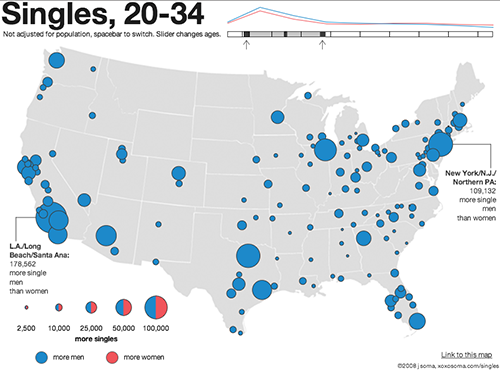
I’ve previously written about my doubts about the “bare branches” theory, which argues that a growing surplus of bachelors in China are a threat to social stability. The study by Andrea Den Boer and Valerie Hudson argued:
- China has a growing surplus of men who will not find marriage partners due to imbalanced sex ratios that will hit 30 million by 2020,
- these men are testosterone powered violence machines,
- an increase in their personal violence can increase the likelihood of war,
- they must be destroyed or exiled, namely by authoritarianism and war.
Now there’s a nifty interactive map on singles in major American cities. There’s huge surplus of single young men in nearly every American city. Den Boer and Hudson argued that the difference between a single man and a bare branch is that a bare branch has no prospects of marriage, while a single man does. Actually, this would really hinge on perception, and that brings up another criticism of their theory of China. What if China’s bare branches are just ignorantly optimistic? As long as they think they can get married one day, would they be less prone to violence? On the flip side, America may be facing a wave of cynical, sarcastic 20-somethings in the U.S. who believe they will never get married, and decide to overthrow the government. We still don’t know if they have any decent education or money, after all.
Moreover, these single men in America are still subject to higher levels of testosterone according to Den Boer and Hudson’s argument, and must be fueling crime in these cities. I don’t disagree that young men are disproportionate responsible for violent crime – however, they also argue this increases the chance of an international conflict. Mexico is being threatened by waves of unmarried men in LA, apparently, and Cuba might be assaulted by an ambitious horde of Spring Break sea pirates. Clearly, the U.S. must invade Iran to purge the nation of these uncontrollable young hooligans. Or start a government initiative to wed them to legions of cougars.
———————
My previous and more serious criticisms of the “bare branches” theory were:
- The study doesn’t address the fact that the current surplus of 14-18 million men shows no correlation to increased violence or instability, and they didn’t even examine the current surplus,
- the authors ignore that the very literature they cite argues that high testosterone does not necessarily correlate to violence or lower social status,
- they give no evidence why this supposed inclination towards internal violence would translate into a greater chance of international conflict,
- their historical example in China, the Nien Rebellion, does not account for huge societal changes, such as the lack of abandoned 5th string sons,
- they dismiss that government, familial or other societal obligations might mitigate this alleged propensity to violence,
- they misread other literature they cited which in fact makes a case that the growing ratio of older to younger men in China would, in fact, decrease the chances of violence,
- they do not address contributing factors such as prostitution or a surplus of 10 million gay males (after subtracting lesbians).